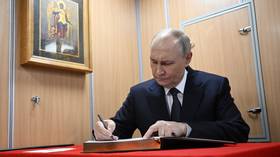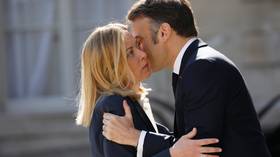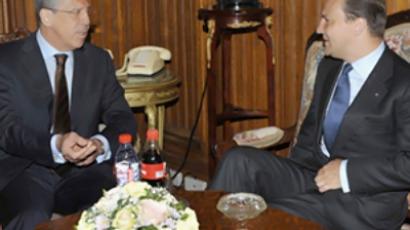NATO expels Russian diplomats
NATO has expelled two Russian diplomats in retaliation for a spy scandal involving the passing of secret information to Moscow by a senior Estonian defense official, report the Financial Times.
One of the expelled diplomats is the son of Vladimir Chizhov, Moscow’s ambassador to the European Union.
Both diplomats were attached to Russia’s mission to NATO and are believed to have worked as undercover intelligence agents, sources in NATO said.
"Two Russian diplomats have been declared personas non-grata for activities incompatible with their diplomatic status," a source said.
While the two agents were not directly connected to the Estonian spy scandal, NATO claims that it caused such damage to the safety of the alliance that they had to take severe measures.
The Estonian scandal involved a high ranking Estonian official within the defense department who passed top-secret information to Russia. In February he was convicted of treason and sentenced to 12 years in jail.
Russia's Ministry of Foreign affairs has called the attempt to deport two Russian diplomats to NATO from Brussels a ‘rude provocation’.
"We have learned about a provocative act against two staff members of the Russian mission at NATO, whom the alliance security service would like to expel from Brussels under a far-fetched pretext and without any clear explanations," said a statement from the Ministry's Press and Information department. "This outrageous action totally contradicts the announcements by the NATO leadership about their willingness to normalize relations with Russia. We will draw our own conclusions from this provocation."
"We urge all NATO members to think about the consequences of what has happened."
Dmitry Rogozin, Russia's permanent NATO envoy called the excuse to expel the diplomats ‘lame’ and warned of the fallout from the actions.
“These sorts of actions, targeted against our mission, will not go unnoticed,” said Rogozin, adding “What the consequences will be is to be decided by the political leadership, which has the full information about the ongoing events.”
Rogozin defended the diplomats saying: “Both diplomats are well-known to their counterparts at NATO's headquarters. They were involved exclusively in their professional diplomatic activity.”
Rogozin said that the expulsion has reversed any positive effects the first meeting of the Russia-NATO council since the South Caucasus crisis last August may have had on relations.
“NATO's Secretary-General Jaap de Hoop Scheffer made this statement to me immediately after the ambassadorial meeting of the Russia-NATO Council. This reduced its political effects to nothing,” Rogozin said.
“I assert – and insist – that this step is totally unfounded. It has no relation to any espionage scandals whatsoever. Accusing our two diplomats of conducting any espionage activities is akin to establishing any relations between them and the legendary spy figures. ‘Absurd’ and ‘nonsense’ are the words that are going to appear quite frequently now in our negotiations with NATO, which have been seriously complicated by a scandal like this,” he added.
On Wednesday the Russia-NATO Council met in session. NATO's spokesman James Appathurai heralded the meeting as a resumption of the Russia-NATO political dialogue which had been cut off since the conflict in South Ossetia began in August.














